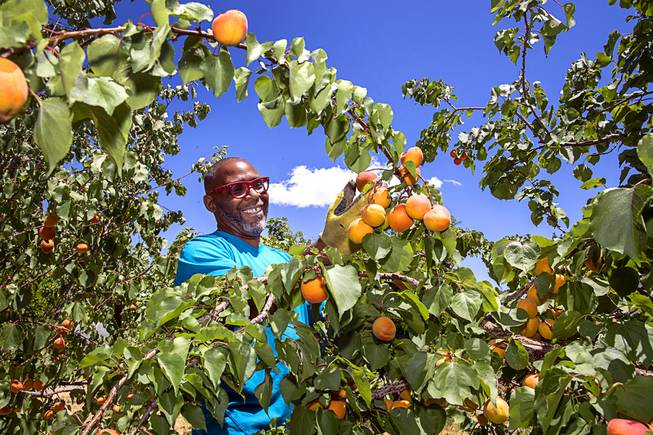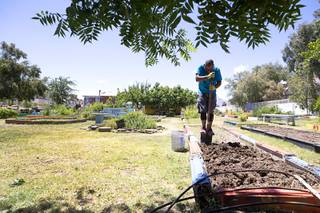
Gardener David McClenton II looks over apricots in the Las Vegas Roots Community Garden orchard Tuesday, May 19, 2020.
Sunday, May 24, 2020 | 2 a.m.
Research has shown that spending time outdoors can be beneficial for our mental health, and in this time of social isolation, we can turn our backyards into green space sanctuaries.
Avid gardeners swear by the meditative effects of tending to a garden and watching something grow. It requires a kind of patience and presence that soothes the mind and restores our connection to the earth. It’s also a physical activity, and there’s an end result to look forward to—fruits and vegetables that can nourish our bodies.
“Gardening has been a lot of help,” says Erin Holloway, office manager at Vegas Roots, a community urban garden Downtown. “As for myself and others that come in, they actually find themselves paying attention to the plants and different aspects of gardening, planting and harvesting. It’s quiet and peaceful. You commit to the earth and everything around you.”
Vegas Roots offers plots that people can “adopt” for the year and where they can plant whatever they want; the organization does the watering and provides the seeds and the support, with a gardener on staff. It’s a good way for novices to get started and learn the basics, and to join a community of gardeners.
“I’ve had people come in [who] were terrified of gardening, afraid of the process and not knowing what to do,” Holloway says. “But these people with their little plots have flourished, they are growing things. … It’s fun to watch them come in and enjoy taking care of the plots. They get so excited when they get to harvest stuff.”
The effects of gardening are apparent at any age, but for children, learning how things grow is essential for their physical and mental development. That’s why Green Our Planet, a nonprofit conservation organization, aims to plant as many gardens in schools as possible. “When we talk to principals, they actually bring up this idea that they want the garden for the mental health of their students and for their parents,” says Ciara Byrne, founder and co-executive director of Green Our Planet.
“At Elaine Wynn Elementary, we built a beautiful and very large garden, and the principal wants to create a meditation space there. Her goal is to have her teachers teach their students how to meditate.”
Teachers are learning that having a school garden can help calm kids who are having a difficult day. “The change in location changes the story and changes their mindset,” Byrne says.
Cultures around the world have prized the healing effects of gardens and green spaces for centuries. In Japan, there’s a practice called shinrin-yoku, or “forest bathing.” It’s the act of being immersed in lush, green forests, absorbing nature through the five senses. The country has a restorative forest program that encourages people to go out and walk trails, and it has been shown to lower hypertension and reduce stress and anxiety, says Kim MacQuarrie, founder and co-executive director of Green Our Planet. South Korea has similar healing gardens, which are used to counter the effects of too much technology.
Those of us with backyards can re-create such an environment, and many of us spend more time at home now. Learning how to grow some of what we eat can also make us more self-sufficient and less reliant on food supply chains that are now being tested and strained.
Johnny Church, a local chef who recently opened Johnny C’s Diner, uses produce from his home garden—celery, garlic, tomatoes, herbs, melons and more—at his restaurants. Growing up, Church watched his father tend to the backyard, and now he has embraced the practice, too. “My dad used to say, ‘One day when you get older, you’ll realize yard work is therapy,” Church says.
These days, it’s therapy from which we can all benefit.
How to start a garden
In his weekly podcast Think Act Be, psychologist Seth J. Gillihan talked to Joe Lamp’l, the Joe behind Joe Gardener (joegardener.com), about tips on getting those seeds planted.
• Just start. Decide that you’re going to get started, even though you don’t know exactly what you’re doing. Failure is part of learning.
• Start slow. A simple first step is to grow something in a container that you can put close to your house, so it’s easy to care for. Then grow your garden little by little.
• Focus on healthy soil. “Soil is life. When you focus on that, good things happen,” Lamp’l says. Avoid synthetic chemicals, and use organic material like compost.
• Grow what you like. When you choose fruits and vegetables that you want to eat, you’ll have more motivation to stick with it.
• Know your plants’ needs. Read plant tags carefully so you know the best environment to place them—sun or shade, wet or dry.
• Pay attention to your plants. Observe them every day and see what’s happening. It’s the best way to get therapeutic benefits from your garden.

